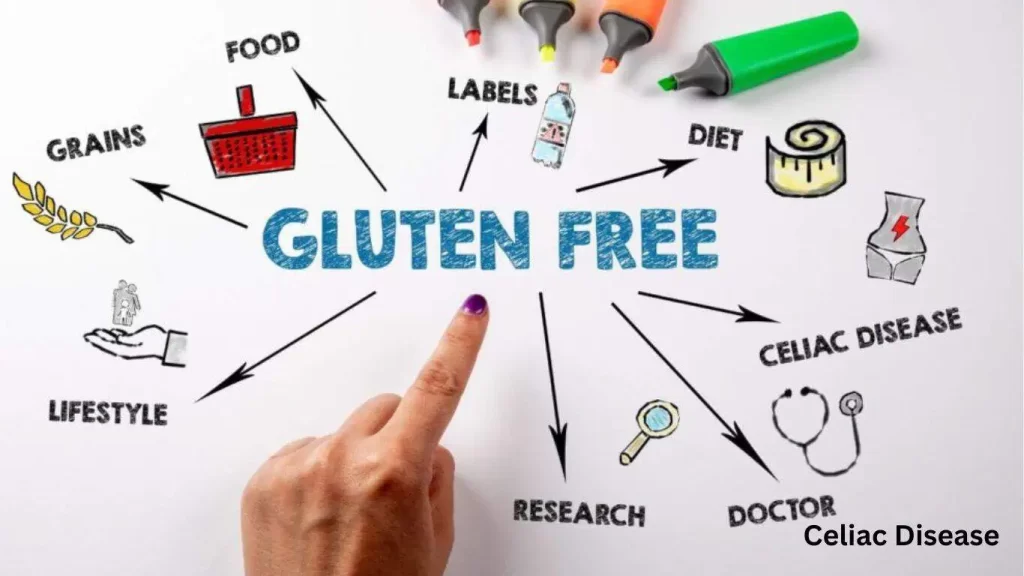How to Talk to Your Teen About Celiac Disease in Teens: Supportive Parent’s Guide
Your teen, once full of energy, starts experiencing chronic stomach pain, unexplained fatigue, and weight loss. After a series of tests, the diagnosis is finally confirmed: celiac disease.
Receiving a celiac disease diagnosis in teens can feel overwhelming for the whole family.
It affects not only what’s on their plate but also school events, friendships, and family routines.
You might wonder:
“How can I talk to my teen about their celiac disease diagnosis in a way that empowers them, not frightens them?”
In this guide, you’ll discover practical, supportive steps to help your teen understand, adjust to, and thrive after a celiac disease diagnosis.

Understanding Celiac Disease in Teens: What Parents Need to Know
Celiac disease is more than just a food allergy.
It’s an autoimmune disorder where eating gluten (a protein in wheat, barley, and rye) triggers the immune system to attack the small intestine, causing inflammation and damage.
Typical symptoms include:
- Chronic abdominal pain
- Gastrointestinal issues
- Joint pain
- Fatigue
- Weight loss
- Nutritional deficiencies
Quick Fact:
About 1 in 100 people worldwide are affected by celiac disease, but only about 30% are diagnosed, according to the Celiac Disease Foundation.
Action Tip: Sit down with your teen and explore educational resources together (like videos or interactive websites) so they feel involved, not lectured to.
How to Explain a Celiac Disease Diagnosis to Your Teen
When you break the news:
- Be honest but reassuring: Acknowledge the lifestyle change, but frame it as manageable.
- Describe the science simply: Explain how gluten damages their intestines and how a gluten-free diet heals them.
- Normalize it: Mention that many celebrities (like Drew Brees, an NFL star) and influencers live full lives being gluten-free!
💬 Example Talking Point:
“Your diagnosis explains why you’ve been feeling bad. Now that we know what’s going on, we have a plan to help you feel strong and healthy again.”
Address Their Fears and Feelings Head-On
Expect reactions like:
- “Will I ever be able to eat out again?”
- “Will my friends make fun of me?”
- “Am I broken?”
Listen First: Validate their feelings without rushing to “fix” them.
Empower Them:
Tell stories of real teens who took charge of their diagnosis, like a high schooler who started a gluten-free bake sale club!
Invite Them to Be Part of the Solution
Teen Buy-In is Critical, here’s how:
- Take them grocery shopping and let them pick out gluten-free snacks.
- Try gluten-free cooking nights where they choose the recipes.
- Teach them how to read food labels like a pro (e.g., spotting hidden gluten).
✅ Checklist for Involving Teens:
- Grocery shop together
- Pick out new gluten-free restaurants
- Cook a gluten-free meal once a week
- Research safe travel snacks
Building a Support System for Teens Diagnosed with Celiac Disease
At Home:
- Educate all family members about cross-contamination (e.g., separate toasters and utensils).
- Hold a “Gluten-Free 101” night, make it fun and informative!
At School:
- Meet with the school nurse and teachers.
- Ask about 504 Plans (legal accommodations for medical conditions).
In the Community:
- Join teen-focused celiac support groups (some have online hangouts and meetups).
- Explore mentorship programs, pairing your teen with an older teen who’s already living gluten-free can be powerful.
Show Them the Delicious Side of Gluten-Free Life
Busting the myth that gluten-free = boring is a huge win.
Ideas for Delicious Discovery:
- Visit a gluten-free bakery together.
- Experiment with international cuisines (like Thai or Mexican) that are naturally gluten-free.
- Host a “Gluten-Free Food Night” for friends.
Resource Tip:
Some great gluten-free brands teens actually love:
- Canyon Bakehouse (bread)
- Banza (chickpea pasta)
- Enjoy Life (cookies and snacks)
Focus on Growth, Not Loss
End every conversation by highlighting what’s possible:
- Better energy
- Clearer skin
- Improved mood
- A chance to advocate and help others
🌟 Big Message to Send:
“You’re not broken, you’re just building a different, healthier path for yourself.”

Bonus Resource List for Parents and Teens
Here’s where you and your teen can find reliable, up-to-date info:
Final Takeaway: Celiac Disease Isn’t a Full Stop, It’s a New Start
Yes, a celiac diagnosis is a life change.
But it can also be the start of stronger family connections, better health, and a more empowered, confident teen.
Stay patient, stay positive, and remember, you’re not just managing a condition, you’re nurturing a resilient, thriving young person.
FAQs About Celiac Disease in Teens
Here are answers to common questions parents and teens often have after receiving a celiac disease diagnosis.
What is celiac disease in teens?
Celiac disease in teens is an autoimmune disorder where eating gluten triggers the immune system to attack the small intestine.
This leads to symptoms like stomach pain, fatigue, joint pain, and weight loss.
Teens with celiac disease must follow a strict gluten-free diet to manage their condition and prevent long-term health issues.
What are the signs of celiac disease in teenagers?
Signs of celiac disease in teenagers can vary, but common symptoms include:
Chronic abdominal pain
Fatigue
Unexplained weight loss
Bloating or diarrhea
Skin rashes
Mood changes or depression If your teen shows several of these symptoms, it’s important to consult a healthcare provider for testing.
How is celiac disease diagnosed in teens?
Celiac disease in teens is typically diagnosed through a combination of blood tests (checking for specific antibodies) and an intestinal biopsy to confirm damage to the small intestine.
In some cases, genetic testing may also be recommended. Early diagnosis is key to managing symptoms and preventing complications.
How can I support my teen after a celiac disease diagnosis?
Supporting a teen after a celiac disease diagnosis involves:
Learning about gluten-free living together
Involving your teen in shopping and meal planning
Educating family, friends, and school staff about cross-contamination risks
Encouraging open conversations about emotional challenges
Connecting with teen-focused celiac support groups
Empowering your teen to take ownership of their health helps build confidence and independence.
Can teens with celiac disease still eat out at restaurants?
Yes, teens with celiac disease can enjoy dining out, but they must be cautious.
Look for restaurants with dedicated gluten-free menus, ask about kitchen practices to avoid cross-contamination, and encourage your teen to advocate for their dietary needs confidently.
Is it hard for teens to adjust to a gluten-free lifestyle?
Adjusting to a gluten-free lifestyle can be challenging at first, especially for teenagers navigating school life and social situations.
However, with strong family support, access to delicious gluten-free foods, and the right mindset, most teens adjust well and thrive.
How can I help my teen explain their celiac disease to friends?
Encourage your teen to practice a simple, confident explanation like:
“I have celiac disease, so I can’t eat gluten because it makes me really sick. Thanks for understanding!”
Help them role-play conversations and remind them it’s okay to advocate for their health.







